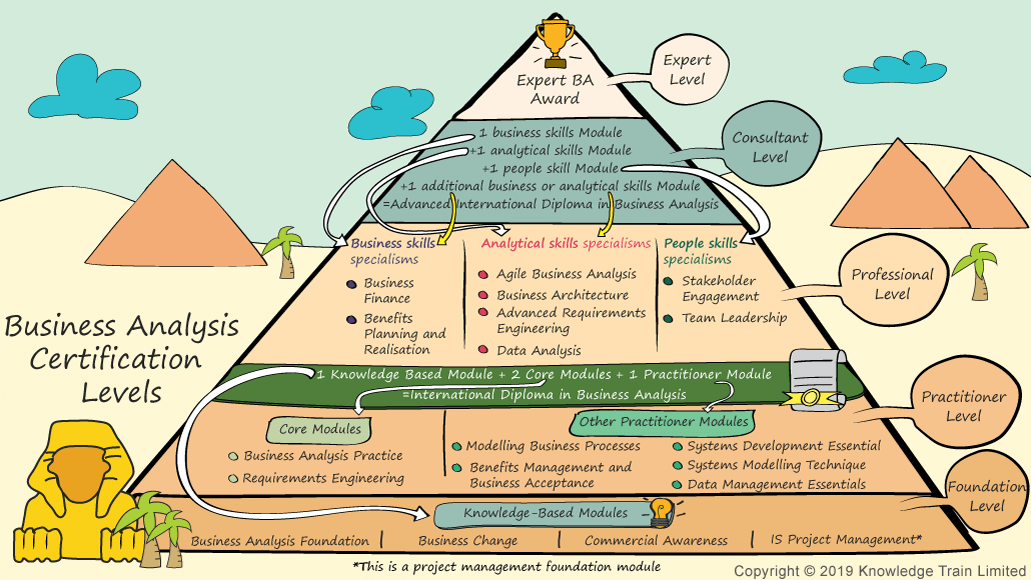Better known for its project management certifications, the PMI has added a business analysis qualification to its broad range of professional certifications.
PMI-PBA is popular in the USA and provides a broad set of knowledge-based understanding of business analysis, but requires substantial business analyst experience to become certified.
Understanding Business Analyst certification
Business analysis certification is crucial for those looking to excel in the field. It helps individuals achieve their career goals by providing recognised credentials that enhance their skills and knowledge.
What is Business Analyst certification?
A Business Analyst certification proves an individual’s expertise in business analysis. It is widely recognised across industries and signifies that the holder has met specific standards of proficiency and knowledge.
Why pursue a Business Analyst certification?
Pursuing a Business Analyst certification can significantly advance your career. It helps develop critical skills, increases earning potential, and aligns your career goals with industry standards.
How does certification enhance your career?
Certification boosts your career by providing a structured education pathway, improving earning potential, and enhancing leadership opportunities. It also increases your visibility in the job market.
What skills can you gain from certification?
By obtaining a certification in business analysis, you can gain essential skills such as:
- Effective business analysis techniques
- Project management methodologies
- Data analytics proficiency
- Enhanced problem-solving abilities
What are the types of Business Analyst certifications?
There are various types of Business Analyst certifications, each tailored to different career goals and levels of expertise. Understanding these options can help you choose the most applicable certification for your progression.
How do different certifications compare?
Certifications differ in terms of scope, benefits, and alignment with career goals. Comparing them can provide insights into which certification best suits your professional needs.
Which accredited certification bodies offer recognised certifications?
Several certification bodies are widely recognised and accredited for offering Business Analyst certifications. These include:
- International Institute of Business Analysis (IIBa)
- Project Management Institute (PMI)
- British Computer Society (BCS)
Steps to becoming a certified Business Analyst
Prerequisites for certification
What are the necessary qualifications?
To become a certified Business Analyst, you need specific qualifications. These typically include a degree in business or a related field and relevant certification. It’s necessary to have a foundational knowledge of business analysis principles. Once these qualifications are earned, professionals show their commitment to the field and gain industry recognition.
Is work experience required?
Work experience is important for Business Analyst certification. While entry-level positions may require less experience, having visible work experience is beneficial. It makes you more attractive to potential employers and showcases your thought leadership in the field. Certification often requires demonstrating practical expertise gained through professional roles.
Preparing for the certification exam
What study materials are recommended?
Effective preparation for the certification exam involves using various study materials. This includes training manuals, recognised textbooks, and e-learning modules. These resources provide comprehensive coverage of business analysis principles and enhance your autonomy in the learning process. Additionally, online data analytics tools can help in understanding complex topics.
How do I prepare for the exam effectively?
To prepare for the certification exam effectively, consider enrolling in virtual classroom sessions or e-learning courses. These formats offer flexibility and access to expert-led training. Set clear goals and use study materials that align with the certification’s objectives. Consistent study and regular self-assessment can help in demonstrating your advancing expertise.
Certification process overview
What are the certification process steps to take?
The certification process for becoming a Business Analyst involves several steps:
- Education and training: Complete relevant training programs.
- Application: Submit your application to the certification body.
- Exam preparation: Use study materials and prepare thoroughly.
- Certification exam: Sit for the exam and meet the passing criteria.
- Professional development: Engage in ongoing education to maintain certification.
These steps ensure you have the necessary knowledge and skills for professional growth in business analysis.
How long does the certification process take?
The time frame for the certification process varies. Generally, it can take several months from initial education to passing the exam. Factors like personal study pace, availability of study materials, and exam scheduling can impact the duration. Plan and allocate sufficient time for each step to move smoothly through the process.
For more information on becoming a certified Business Analyst or to explore our training programs, visit Knowledge Train.
Instructor-led training options
Instructor-led training offers a structured and guided learning experience in the field of business analysis. This classroom-based training provides direct interaction with experienced instructors and peers, enhancing the overall educational journey. Knowledge Train’s instructor-led courses are designed to be interactive, allowing for immediate feedback and fostering a collaborative learning environment.
What are the benefits of classroom training?
Classroom training in business analysis delivers numerous benefits:
- Expertise: Learn from seasoned professionals with real-world experience.
- Interaction: Engage in sessions that promote interactive learning.
- Networking: Build connections with fellow learners.
- Support: Receive immediate support and guidance from instructors.
- Immediate feedback: Get answers to your questions on the spot.
- Group study: Participate in collaborative exercises that enhance understanding.
- Motivation: Follow structured schedules to maintain learning momentum.
- Direct guidance: Benefit from personalised attention for individual learning needs.
Self-paced online training
For those seeking flexibility, Knowledge Train offers self-paced online training for aspiring Business Analysts. This mode of e-learning is convenient, accessible, and adaptable, making it a cost-effective solution for busy professionals. Asynchronous learning allows participants to train remotely at their own pace, offering the autonomy to fit education into their personal schedules.
How flexible is self-paced learning?
Self-paced online training provides unparalleled flexibility in business analysis education:
- Autonomy: Learn at your own pace and on your terms.
- Balance: Manage your studies alongside work and personal commitments.
- Anytime access: Access course materials 24/7.
- Personal schedule: Study when it’s most convenient for you.
- Individualised learning: Tailor your study plan to fit your specific needs and interests.
Course content and structure
The business analysis courses at Knowledge Train are well-structured to ensure thorough learning. Each course includes detailed training material, organised into modules covering various topics. The curriculum follows a logical sequence, progressing from basic to advanced concepts.
What topics are covered in the courses?
Knowledge Train’s business analysis courses cover a wide range of essential topics, including:
- Core concepts: Fundamental principles of business analysis.
- Tools: Key tools used by Business Analysts.
- Techniques: Effective techniques for data analysis and problem-solving.
- Methodologies: Overview of popular methodologies in the industry.
- Frameworks: Understanding different frameworks applicable to business analysis.
- Case studies: Apply theoretical knowledge to real-world scenarios.
- Practical exercises: Engage in hands-on activities to reinforce learning.
How comprehensive is the training material?
The training material provided in Knowledge Train’s business analysis courses is extensive and thorough:
- In-depth: Covers all critical aspects of business analysis.
- Extensive: Includes a wide range of topics and subtopics.
- Thorough: Provides detailed explanations for each subject area.
- Broad: Addresses both fundamental and advanced concepts.
- Detailed: Offers comprehensive content for complete understanding.
- Encompassing: All-inclusive materials that cover every aspect of business analysis education.
Enrol now and take the next step in your professional development journey.
Advanced certifications and specialisations
What are the next steps after initial certification?
After achieving your initial certification as a Business Analyst, you can take several steps to enhance your professional development. Continuous learning is essential for career advancement and skills development. Key areas to focus on include:
- Ongoing education: Enrol in advanced courses to stay updated with industry trends.
- Certification renewal: Keep your certification valid by completing necessary continuing education units (CEUs).
- Career advancement: Seek mentorship opportunities and consider leadership roles within your organisation.
- Skills development: Pursue specialised training to hone specific skills relevant to your career path.
Which areas can you specialise in?
Specialising allows Business Analysts to gain deeper expertise in specific areas. Popular specialisations include:
- Agile: Improve your ability to manage projects using Agile methodologies.
- Data analytics: Develop skills to analyse and interpret complex data sets.
- Cybersecurity: Learn to protect business assets from cyber threats.
Choosing a specialisation helps Business Analysts align their careers with emerging fields and increase their value to employers.
Continuing professional development
How to maintain and renew your certification?
Maintaining and renewing your certification is vital for sustained professional growth. Here’s how:
- Certification renewal: Regularly update your certification by accumulating CEUs through approved training courses.
- Continuing education: Engage in ongoing learning opportunities such as workshops, seminars, and online courses.
- Professional growth: Participate in industry conferences and network with other professionals to stay informed about the latest developments.
What are the benefits of ongoing education?
Ongoing education offers numerous benefits for Business Analysts, including:
- Career advancement: Enhance your qualifications and open up new career opportunities.
- Knowledge expansion: Stay current with industry standards and best practices.
- Skills enhancement: Continuously improve and update your skill set.
- Professional development: Gain recognition as an expert and leader in your field.
By committing to lifelong learning, Business Analysts can ensure they remain competitive and capable in their careers.
For more information or to enrol in advanced certifications and specialisation courses, visit Knowledge Train or contact us directly.
Career opportunities and advancement
Job prospects for certified Business Analysts
Certified Business Analysts have excellent job prospects due to the high demand across various industries. Certification opens up opportunities for roles such as business analysis consultants, project managers, and systems analysts. This qualification meets market needs and industry demands, enhancing employment opportunities for certified professionals. A clear career path ensures certified Business Analysts are valuable assets in their fields.
Salary expectations for certified professionals
The earning potential for certified professionals in business analysis is significant. Certification often leads to higher salaries and better compensation packages. Certified Business Analysts benefit from improved income, competitive pay scales, and overall greater earning potential. Besides financial rewards, certification can also lead to enhanced job stability and benefits.
Networking and professional growth
Networking is key to professional development in business analysis. Certified Business Analysts should join professional associations and organisations to expand their connections. These networks offer mentorship opportunities and community support, aiding personal and professional growth. Engaging with peers helps stay updated with industry trends, which is crucial for continued career advancement.
By enrolling in courses provided by Knowledge Train, professionals can enhance their skills, broaden their job prospects, and achieve considerable career growth in business analysis.
Key insights
- Our business analyst certification courses are suitable for both new and seasoned professionals aiming to enhance their skills.
- None of our programs reduce quality; each course shows a commitment to excellence.
- The center of our curriculum includes Agile analysis certification to meet current industry demands.
- Our suite of resources, including blog posts about the Agile analysis certification, provides ongoing support.
- Achieving a business analyst certification from Knowledge Train can positively impact salary expectations.
- Through visible elements such as images and podcasts, we cover all aspects of learning.
- In 2024, maximize your potential by enrolling in our programs.
More FAQs
- What are the benefits of obtaining a business analysis certificate?Obtaining a business analysis certificate enhances your employability, shows expertise, and can lead to better salary prospects.
- How does the virtual classroom format work?Our virtual classroom format offers real-time interaction with instructors and peers, making it accessible even for entry-level professionals.
- Is the business analyst course suitable for entry-level professionals?Yes, our BCS BA Foundataion course is designed for both entry-level and seasoned professionals, providing foundational to advanced knowledge.
- Are there any prerequisites for becoming certified in business analysis?Generally, no prior experience is required for our entry-level Foundation courses. However, some certifications may recommend familiarity with Agile or Scrum methodologies.
- What should I include in my resume to stand out as a certified business analyst?Highlight your certification, relevant projects, and key skills such as Agile methodology, data analysis, and problem-solving.
- How do I know if the business analyst certification fits my career goals?If you’re aiming for business analyst roles, a certification in business analysis can be a critical step, adding credibility and expertise.
- What kind of employment opportunities can I expect after certification?Certified business analysts are in demand across various sectors, including IT, finance, and healthcare, improving your job prospects significantly.
- How long does it take to complete the business analyst course?The duration varies, but most of our courses can be completed within three to six months depending on your pace.
- What is the role of Datacamp in your courses?There is no role for Datacamp in our courses.
- Can I get a business analysis certificate through online exams?Yes, we offer online exams that are both convenient and secure, ensuring you can get certified from anywhere.
- Are there any special offers or promotions for new students?We often have promotions for new enrollees. Check our website frequently for updates on discounts and special offers.
- How does the curriculum support ongoing learning and personal growth?Our courses are designed to support ongoing learning by incorporating the latest industry practices and promoting continuous personal growth.
- What makes your business analyst course the best option available?Our course combines practical experience, expert instruction, and flexible learning options, making it one of the best choices for aspiring business analysts.
- 23jigsz129











